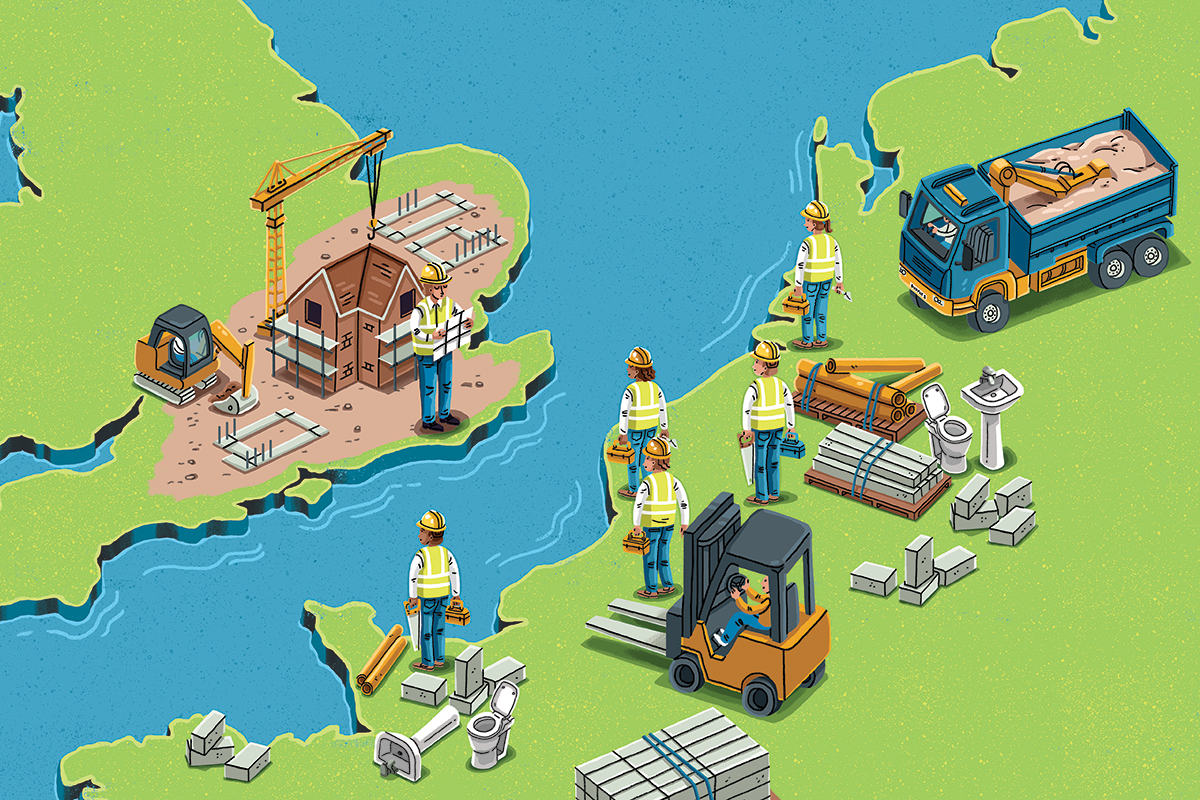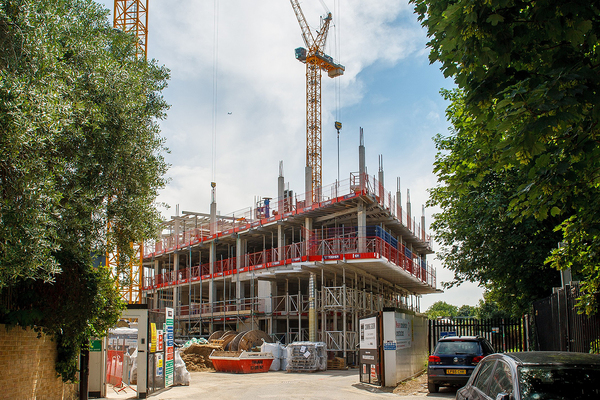Brexit: how will it affect the house builder supply chain?
Tim Clark finds out that shortages of material and labour caused by Brexit are just some of the difficulties facing the construction industry at the moment. Illustration by Elly Walton
“We have a big issue with the Monday morning club,” says Michael Meachen, a project manager for Orbit at its 55-home Chapel View scheme in Shipston-on-Stour. “Come Monday morning, often half the site doesn’t turn up, especially if Aston Villa have been playing.”
Mr Meachen is experiencing first-hand how precarious the supply of both labour and goods can be on construction sites – and how the most unforeseen of circumstances can affect the delivery of new homes.
With Brexit on the horizon, Inside Housing is here to see what pressures already come to bear on the supply chain of a housing scheme – and how the uncertain future could be about to make those pressures much more intense.
Nestled 10 miles south of Stratford-upon-Avon, Shipston-on-Stour is a quintessential North Cotswolds town. Frequently labelled one of the best places to live in the UK, its popularity means the area is in dire need of new homes to meet demand.
The Chapel View scheme is expected to be completed by next July, providing 19 affordable rent homes alongside 36 for market sale.
As sub-contractors begin their day, lugging cement and bricks up to the first floor of one of the new homes, Adam Gaggini, head of technical at Orbit, explains to Inside Housing how managing a casual workforce brings its own difficulties.
“There are so many challenges in resourcing of subbies [sub-contractors],” he says. “You’ll be sent a brickie [by a recruiter] and they will come with the trowel, and you used to be able to presume they are qualified.” That is no longer the case, he says.
“The challenge he [Mr Meachen] has got is he has to almost be like a school teacher: he has to win his sub-contractors’ trust, keep them motivated and deal with all these different personalities.”
While Mr Gaggini estimates that planning – as opposed to supply chain issues – causes “between 50% and 60% of delays” to housing schemes, the inconsistent supply of materials can be just as harmful.
Mr Gaggini believes that Brexit could throw up similar issues to those encountered during the financial crash. He says: “[When] the recession hit in 2007, the brick kilns closed and sites were mothballed. Then with Help to Buy being introduced, we suddenly saw all these people with access to a deposit [who] want to buy a house. But it takes six to nine months to fire up a kiln and get production really going – so I had to look abroad for bricks.”
Back in the present, Mr Meachen agrees that it has been difficult to source bricks because of the ongoing uncertainty. “Bricks are going out to 20 weeks’ lead time. The plots we are starting next week – the bricks for those were ordered at Christmas. Other jobs I have been on, the lead time for bricks is 26 weeks.”
Darren Tyers has run his own bricklaying business – Tyers and Son – since 2003 and is sub-contracted by Orbit at Shipston and other sites. He describes how other house builders have stopped work on site when shortages occurred and finished off at a later date using different materials.
“Once when a shortage happened, I had 25 men on site and had to move everyone off overnight,” he says. “They finished them [homes] off with a different brick and then got some guys in to paint them to make the bricks match.
“They knocked down the ones they had only built the ground floor of.”
For Mr Tyers, the biggest effect of Brexit has been general uncertainty in the market, which he admits has led to some slowdown.
“Everybody was worried, but in the construction industry, we go to recession every seven to 10 years anyway – whether it’s Brexit or something else, we have to deal with it.”
During the build-up to the original Brexit deadline in March, some construction firms stockpiled goods in anticipation of shortages and Shipston has felt the resulting ripple effects. Plasterboard is another of the materials that Mr Meachen says has been hard to come by.
Josh Harris, owner of Bedford-based Harris Carpentry Contractors, has between two and four workers at the Shipston site on any given day. He says: “We have a shortage of plasterboard at the minute, which is really holding up our production – we can’t get into second fixes [installing kitchens and bathrooms] and I don’t know exactly what’s behind it.
“Most building sites are stockpiling and they have no need to stockpile. If they just worked through – if no one stockpiled – there wouldn’t be a problem.”
Upstairs in one of the Shipston houses, a bathroom suite supplied by Spanish sanitary manufacturer Roca is awaiting installation. Roca is one of thousands of UK and international suppliers whose products will find their way to the Shipston site.
Sian Lane, national sales manager at Roca, admits that the company did have to stockpile in advance of the original Brexit deadline. “We have in the region of 15 to 20 containers a day delivered [to UK ports] to stock up. We were fortunate to have space [to store the products].
“The issue [for us] is tariffs. We don’t manufacture in the UK – the products that come in are generally made in the European Union. There is nothing to say we couldn’t manufacture outside the EU, but how long that would take to sort out I don’t know.”
Ms Lane adds: “As soon as you know if we’ve done a deal or not, you can get your ducks in a row. But at present, we have no idea what is going to happen.”
Orbit is working to make its own supply chain more secure. The 43,000-home association partners extensively with local small and medium-sized suppliers where possible. Suppliers for the Shipston site are drawn from a contacts book of 70-odd regional firms specialising in different materials or services from stairs, joints, floors and facing bricks to windows and roofing supplies.
Mr Gaggini explains how having flexibility when it comes to suppliers can come in handy. He cites recent shortages of one type of block, which meant Orbit had to switch supplier quickly to keep its schemes on track.
“Recently, a lack of blocks was a big thing,” he continues. “They [the manufacturers] had run out of fly ash [a component in making the blocks] so aircrete blocks became unavailable.”
But changing materials can throw up unexpected problems. Mr Gaggini says many bricklayers don’t like working with those particular blocks.
“[The new blocks] are quite good and I know some builders who are still using them, but some bricklayers may refuse to price up [the work],” he explains. “They don’t want to lift these blocks. Brickies are fickle – they have their trowel and their spirit level and if someone offers more, they will be off. You can’t plan for that.”
And what about the availability of labour in a post-Brexit world? The issues at Shipston are arguably a microcosm of the wider industry, as firms deal with an ageing workforce, skills shortages, and economic uncertainty even before accounting for the fallout from Brexit.
Mr Tyers says: “I have got some Romanians [working for] me. They are worried in case they get ordered home but I don’t think they will be. The construction industry is in such great need of construction workers – no site now has less than 15% foreign labour, maybe more, and that may be up to 80% in London.”
Mr Harris says that although many foreign workers may stay, some are returning home. “They [carpenters] can earn £120 a day now at home. They are earning £220 a day here, but their living costs are much less at home. If you are paying £1,500 a month to rent in London then going home to cheaper housing in the Czech Republic is enticing.”
Back at Shipston, outside the scheme’s lavish showroom, one labourer is taking out his frustration on a garage door with his fists. He has lost the key and can’t get in. Mr Meachen manages to hide his own frustrations rather better, but it is clear construction is a constant juggling act of balancing labour, materials and funding. Often one problem can spark a domino effect, as delays and pressure points build up.
“Most building sites are stockpiling and they have no need to stockpile. If they just worked through there wouldn’t be a problem” – Josh Harris, Harris Carpentry Contractors
Besides worries about the availability of labour and materials, Brexit could also influence investment in the construction sector by both large and small businesses over the coming years.
Mr Harris says that he has redrawn his own plans over the past three years. “When the vote came through in 2016, I was with friends and they had their heads in their hands – they knew what would happen,” he recalls.
“I was going to buy a crane and start a lifting company. But I have not gone ahead with that, due to the uncertainty Brexit has caused. I’m not going to invest £200,000 of my money if, in a year’s time, we might not have work.”
Dan Barnes, land and property director at Orbit, says that the housing association is insulated from the market to a certain extent. It has plans in place to shift the tenure of its homes to match market conditions if necessary.
“What we are starting to do is introduce flexibility into schemes,” he says. “Shipston-on-Stour is a market sales scheme and is a product tailored towards market sale. But we are trying to adapt our schemes so that sites can be developed for open market or affordable tenures [instead].”
Despite the challenges at the Shipston site, the scheme is expected to finish on time and Orbit has been inundated with enquiries from potential buyers.
However, in the long term, both Mr Gaggini and Matt Lyons, head of design at Orbit, believe that a shift to an offsite manufacturing model could help solve the delays and address the skills shortage.
“I think if we move construction into more manufacturing, the stability of the manufacturing role will be more attractive for people,” Mr Lyons elaborates.
Mr Gaggini agrees that many future schemes will be led by offsite manufacturing. “They can build a home in 11 days. It’s going to take us up to eight years to build 55 here.”
The challenges that Orbit has faced at Shipston are not unique, but perhaps the biggest problem is that the impact of Brexit is still unknown. Yet despite uncertainty over the supply of materials and labour, Mr Gaggini is confident that these challenges will ultimately be overcome.
“Brexit is about how we trade and there is – or will be – an added cost to that,” he says.
“But we are an inventive and intelligent lot on this island – we will find a way.”
Read more about Brexit
Brexit and the social housing sector: the key risks As the tortuous process of exiting the European Union approaches its denouement, the country remains in a state of uncertainty about what exactly is going to happen. Peter Apps recaps the key risks to the social housing sector
Downturn: why is L&Q cutting its surplus in half and what does it mean for the sector After L&Q revealed it is likely to cut its surplus by £158m this year, Peter Apps asks what this means for the financial model which has defined the housing association sector since 2010
What housing associations are doing to stress-test for Brexit With the UK’s departure from the EU looming, Luke Barratt looks at what housing associations have been doing to prepare
Regulator writes to housing associations with no-deal Brexit warning The regulator has issued a warning to housing associations over the threat of a no-deal Brexit, outlining key risk areas including shortages of crucial materials, a housing market crash and difficulties accessing ‘business-critical’ data
Sector draws up contingency plans for no-deal Brexit The country’s largest housing associations are putting in place contingency plans to protect the future of their organisations
How would the sector cope with a no-deal Brexit? As uncertainty around Brexit mounts and a no-deal looms, Inside Housing asks what it could mean for the housing sector
Current grant system won’t work in a falling market The government needs to think again about grant to prevent housing association development from collapsing in a falling market, writes Matthew Bailes.
S&P would downgrade half its rated housing associations after no-deal Brexit The credit ratings agency Standard & Poor’s (S&P) has said it will downgrade associations it rates if the UK leaves the European Union without a deal
Click here for all our Brexit news to date












